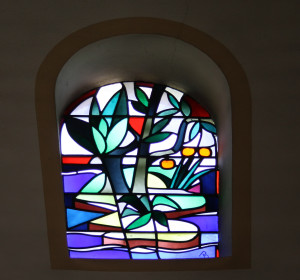
“And God said: ‘Let there be lights in the firmament of the heaven to divide the day from the night…” (Genesis 1:14).
Rashi explains that there is an allusion to the creation of these lights on the first day of Creation but God commanded them to be suspended in the heavens. This teaching is corroborated by the Rabbis.1
“But was the light created on the first day? For, behold, it is written: And God set them in the firmament of the heaven, and it is [further] written: And there was evening and there was morning a fourth day — This is [to be explained] according to R. Eleazar. For R. Eleazar said: The light which the Holy One, blessed be He, created on the first day, one could see thereby from one end of the world to the other; but as soon as the Holy One, blessed be He, beheld the generation of the Flood and the generation of the Dispersion, and saw that their actions were corrupt, He arose and hid it from them…” (Chagigah 12a).2
Ramban taught that light was created on the first day but when the firmament was created on the second day it intercepted the light thus preventing it from illuminating the lower entities that had been created. This is why the earth was dark. On the fourth day, God decided to place luminaries in the firmament to shed light upon the Earth.3
All the created entities generated from heaven and earth, Rashi goes on to explain, were created on the first day. Each of these entities were fixed in their permanent positions and functions on the day that it was decreed by God.1
“[A]nd let them be for signs, and for seasons, and for days and years; …” (Genesis 1:14). From this passage we learn that when solar or lunar eclipses occur it is a bad sign for the world.
“Our Rabbis taught, When the sun is in eclipse, it is a bad omen for the whole world. This may be illustrated by a parable. To what can this be compared? To a human being who made a banquet for his servants and put up for them a lamp. When he became wroth with them he said to his servant, ‘Take away the lamp from them, and let them sit in the dark’” (Sukkah 29a).4
We are called upon to not “fear the signs of heaven, even though the nations fear them, for the ways of the nations are nonsense” (Yirmiyahu 10:2-3).5 If Israel performs the will of God the people need not worry about the punishments that are portended by the eclipse.1
“But when Israel fulfil the will of the Omnipresent, they need have no fear of all these [omens] as it is said, Thus saith the Lord,’ Learn not the way of the nations, and be not dismayed at the signs of heaven, for the nations are dismayed at them, the idolaters will be dismayed, but Israel will not be dismayed” (Sukkah 29a).4
These lights were set in the firmament to be used as signs for the seasons for Israel will be commanded in the future to celebrate the festivals in their fixed times. The times of the festivals are fixed by the signs of the moon since Israel calculates months by the sign of the new moon.1
These lights are also set in the firmament to be used by mankind to calculate the length of the day and the length of the night. The lights are set in a consistent course so the lunar month lasts approximately 30 days and the solar year lasts 365 days.3
“[T]welve constellations have I created in the firmament, and for each constellation I have created thirty hosts, and for each host I have created thirty legions, and for each legion I have created thirty cohorts, and for each cohort I have created thirty maniples, and for each maniple I have created thirty camps, and to each camp I have attached three hundred and sixty-five thousands of myriads of stars, corresponding to the days of the solar year” (Berachot 32b).6
——————–
1Yisrael Herczeg. The Torah with Rashi’s Commentary – Genesis. (New York: Mesorah Publications, Ltd., 2000).
2I. Epstein. Soncino Babylonian Talmud. (London: Soncino Press, 1949). [http://halakhah.com/pdf/moed/Chagigah.pdf]
3Charles Chavel. Ramban Commentary on the Torah – Genesis. (New York: Shilo Publishing House, Inc., 1971).
4I. Epstein. Soncino Babylonian Talmud. (London: Soncino Press, 1949). [http://halakhah.com/pdf/moed/Sukkah.pdf]
5Aryeh Kaplan. The Living Nach: Later Prophets. (New York: Moznaim Publishing Corporation, 1995).
6I. Epstein. Soncino Babylonian Talmud. (London: Soncino Press, 1949). [http://halakhah.com/pdf/zeraim/Berachoth.pdf]
